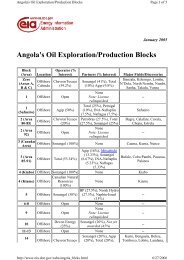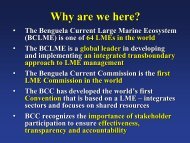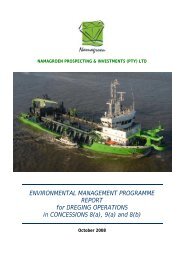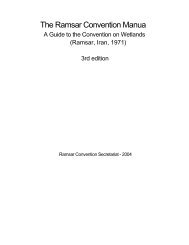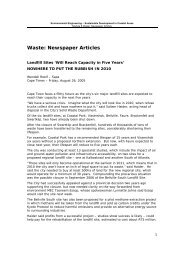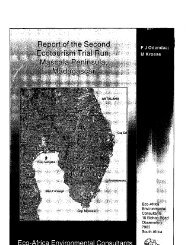Full report LR.pdf - DLIST Benguela
Full report LR.pdf - DLIST Benguela
Full report LR.pdf - DLIST Benguela
- No tags were found...
You also want an ePaper? Increase the reach of your titles
YUMPU automatically turns print PDFs into web optimized ePapers that Google loves.
NACOMA Project – Preparation PhaseAnalysis of the Institutional Capacity in the Namib Coast Regional Councilso Communication - Insufficient communication and co-operation between, and among,central government and Regional Councils have been identified as a majorimpediment to the decentralisation process. As the lead agency, the MRLGH isexpected to keep the relevant parties constantly abreast of developments and progressmade. Also, the lack of open communications channels and bureaucratic delays(mainly caused by line ministries) is perceived as a major impediment to regionaldevelopment. To improve the flow of information among the relevant stakeholders, anewsletter focussing on decentralisation was proposed although it never materialised.o Mandate of Regional Councils - The functions of Regional Councils are clearlydelineated by the Act. It is conspicuous that the powers and functions of theseCouncils are largely confined to regional planning and development – except forsettlement establishment, management and control where control is fully granted toRegional Councils. However, Regional Councils find it virtually impossible to fulfilthis fundamental function due to limited skilled personnel and material resources.Ever decreasing budgets, limited and frequently shared office space, lack of technicalexpertise or the tools to do planning (such as GIS), inadequate transportation, etc.makes development planning difficult. It is also noteworthy that regional planningand development provides for the ‘natural environment’. However, the skills requiredto deal with environmental issues are non-existent – throughout the RegionalCouncils.o Human resources – While there is undeniably no question in terms of the Act thatRegional Councils must develop capacity to manage, monitor and communicateregional development planning, including environmental planning and management,there are no guidelines on how to go about such tasks. There is no national model todemonstrate how to do this. This is complicated by the diversity of issues in thecoastal areas and differences (geographic) between regions. All Regional Councilsare confronted with skill deficiencies which demands skilled human resources whocould devise region-specific intervention strategies based on distinctive assessments.3.5 CONCLUSIONS AND MAIN CHALLENGES FOR THE DECENTRALISATION PROCESS3.5.1 General ConclusionsIt is clear that the Decentralisation process, which is primarily driven by the MRLGH(via the DDC), has attained multiple milestones, considering its relatively short history.However, there are some impediments to decentralisation - it appears that theimpediments to the decentralisation progress start at the planning level and continue tothe implementation level.At the root of these planning-oriented constraints are 10 : the lack of a coherent transitionplan (management and operational) understood and endorsed by the relevant10 These constraints were echoed at the ‘National Workshop on Organisational Structuring and Recruitmentof Staff to Regional Councils’ Establishment’, held on 15-17 September 2004 at Tsumeb.14



